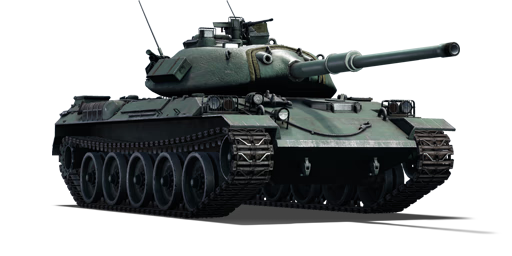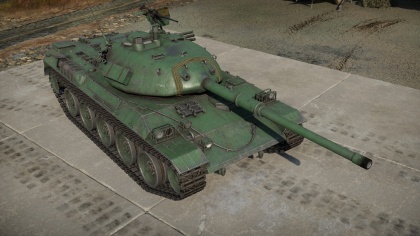Difference between revisions of "STB-2"
(→Usage in the battles) (Tag: Visual edit) |
(→Media: Added video) |
||
| Line 209: | Line 209: | ||
== Media == | == Media == | ||
| − | + | <!--Excellent additions to the article would be video guides, screenshots from the game, and photos.--> | |
| + | ;Videos | ||
| + | {{Youtube-gallery|GgC8UNa8dok|'''Leopard I vs STB-1''' - ''War Thunder Official Channel''}} | ||
== Read also == | == Read also == | ||
Revision as of 22:43, 19 April 2020
Contents
Description
The STB-2 is a Rank Japanese medium tank
with a battle rating of (AB), (RB), and (SB). It was introduced along with the entire Japanese Ground Forces tree in Update 1.65 "Way of the Samurai". The prototype of the Type 74, the STB-1 presents many features that would be in the final design.
The STB-1 is the first researchable tank in Japan's Ground Forces Rank V. Despite having considerable more armour than its comparable counterparts the Leopard 1 and Leopard A1A1, as well as comparable mobility, it is not recommended as a front-line tank like the 'Allied' counterparts. Instead, a cautious hit-and-run tactic like the Leopards should always be employed. Using the tank's hydropneumatic suspension correctly can help with the tank's depression, and in some cases, aid in survivability. Do note that the L7 on this tank reloads significantly longer than other L7-equipped tanks.
The STB-1 is unique among being one of the only Japanese tanks that can take a hit, like the Type 4 Chi-To Late and Type 5 Ho-Ri Production. It has thick frontal hull armour that can bounce shots effectively, but should not be relied on. The tank is quite fast and is further aided by the Hydropneumatic suspension, which allows this tank to manoeuvre the battlefield much like a Leopard, however the abundance of larger, more open maps at higher ranks means that getting from point A to B - and not getting shot - is not a simple as it sounds.
General info
Survivability and armour
| Armour | Front | Sides | Rear | Roof |
|---|---|---|---|---|
| Hull | 40-80 mm (64-73°) Front glacis 100 (26°), 80 mm (58-66°)Lower glacis |
35-40 mm (44°) Top 40 mm (0-55°) Bottom |
25 mm (1-46°) | 20 mm |
| Turret | 132 mm (12-66°) Turret front 100-200 mm (1-66°) Gun mantlet |
132 mm (1-54°) 75 mm (26-61°) Rear |
40 mm (1-64°) 40 mm (36-82°) Turret underside |
67 mm Front 20 mm Rear |
| Armour | Sides | Roof | ||
| Cupola | 30 mm | 30 mm |
Notes:
- Suspension wheels and tracks are 20 mm thick.
- Driver's vision port on the front glacis are only 50 mm thick.
- Hull roof is rated to be 54 mm effective against HE.
Mobility
| Game Mode | Max Speed (km/h) | Weight (tons) | Engine power (horsepower) | Power-to-weight ratio (hp/ton) | |||
|---|---|---|---|---|---|---|---|
| Forward | Reverse | Stock | Upgraded | Stock | Upgraded | ||
| Arcade | Expression error: Unexpected * operator. | 1162 | Expression error: Unexpected round operator. | __.__ | |||
| Realistic | 663 | Expression error: Unexpected round operator. | __.__ | ||||
Armaments
Main armament
| 105 mm L7A3 | |||||
|---|---|---|---|---|---|
| Capacity | Vertical guidance |
Horizontal guidance |
Stabilizer | ||
| 50 | -6°/+9° | ±180° | Two-plane | ||
| Turret rotation speed (°/s) | |||||
| Mode | Stock | Upgraded | Prior + Full crew | Prior + Expert qualif. | Prior + Ace qualif. |
| Arcade | 22.85 | 37.9 | 38.4 | 42.5 | __.__ |
| Realistic | 14.28 | 16.8 | 20.4 | 22.6 | __.__ |
| Reloading rate (seconds) | |||||
| Stock | Prior + Full crew | Prior + Expert qualif. | Prior + Ace qualif. | ||
| 10.8 | 9.6 | 8.8 | __.__ | ||
Ammunition
| Penetration statistics | |||||||
|---|---|---|---|---|---|---|---|
| Ammunition | Type of warhead |
Penetration in mm @ 90° | |||||
| 10m | 100m | 500m | 1000m | 1500m | 2000m | ||
| M392A2 | APDS | 303 | 302 | 296 | 277 | 257 | 252 |
| M393 | HESH | 127 | 127 | 127 | 127 | 127 | 127 |
| M456 | HEATFS | 400 | 400 | 400 | 400 | 400 | 400 |
| Shell details | ||||||||||
|---|---|---|---|---|---|---|---|---|---|---|
| Ammunition | Type of warhead |
Velocity in m/s |
Projectile Mass in kg |
Fuse delay
in m: |
Fuse sensitivity
in mm: |
Explosive Mass in g (TNT equivalent): |
Normalization At 30° from horizontal: |
Ricochet: | ||
| 0% | 50% | 100% | ||||||||
| M392A2 | APDS | 1,478 | 5.8 | N/A | N/A | N/A | +1.5° | 75° | 78° | 80° |
| M393 | HESH | 730 | 15 | 0.4 | 0.1 | 4,310 | +0° | 73° | 77° | 80° |
| M456 | HEATFS | 1,173 | 11 | 0.0 | 0.1 | 1,270 | +0° | 65° | 72° | 75° |
Ammo racks
| Full ammo |
1st rack empty |
2nd rack empty |
3rd rack empty |
4th rack empty |
Visual discrepancy |
|---|---|---|---|---|---|
| 50 | 44 (+6) | 16 (+34) | 10 (+40) | 1 (+49) | No |
Hull floor empty: 44 (+6)
Machine guns
| 12.7 mm M2HB | ||||||
|---|---|---|---|---|---|---|
| Pintle mount | ||||||
| Capacity (Belt capacity) | Fire rate (shots/minute) |
Vertical guidance |
Horizontal guidance | |||
| 660 (200) | 577 | -10°/+40° | ±180° | |||
| 7.62 mm M1919A4 | ||||||
|---|---|---|---|---|---|---|
| Coaxial mount | ||||||
| Capacity (Belt capacity) | Fire rate (shots/minute) |
Vertical guidance |
Horizontal guidance | |||
| 4,500 (250) | 500 | N/A | N/A | |||
Usage in the battles
The STB-1, while often compared as a 'better' Leopard 1, should still be treated carefully as a tank. Aggressive play is not unsafe and can be very rewarding at times. Keep in mind the STB-1 has a chance of bouncing, but most shots in the turret result in loss of horizontal turret drive, cannon breech, or essential crew.
The STB's biggest threats are agile vehicles with fast reloads. Due to a reload that is longer than many other tanks you want your first shot to disable their gun.
Pros and cons
Pros:
- Highly mobile, comparable to the German Leopard I.
- More armour than the German Leopard (around 100m hull and turret).
- 105 mm L7 cannon found on other NATO tanks.
- May bounce APHE shells.
- Low profile.
- Utilization of hydropneumatic suspension allows for various offensive and defensive options.
- 12.7 mm Browning Machine Gun.
- 2-plane stabilizer that allows it to fire on the move
Cons:
- Other areas are lightly armoured, vulnerable to high penetrating SPAA.
- Reload and top speed slower than Leopard.
- Small gun elevation angle.
- Engine vulnerable to some aircraft with powerful guns.
History
The prototype for the Type 74. Known in Japanese as 74式戦車の試作車STB-1 (ななよんしきせんしゃのしさくしゃSTB-1). Created in September 1969 along with STB-2 in the STT program. Due to issues with cost effectiveness these two prototypes were not considered for the replacement of the Type 61. In a bid to reduce costs STB-3, STB-4, STB-5 and STB-6 were produced between April 1970 to December 1971. The final judgement for the STT program was held in November 1973 which lead the line to be completed in 1974. And, production started the following year in 1975 for the Type 74.
Media
- Videos
Read also
Sources
Paste links to sources and external resources, such as:
- topic on the official game forum;
- other literature.
| Japan medium tanks | |
|---|---|
| Type 97 | Chi-Ha · Chi-Ha Kai · Chi-Ha Kai TD · Chi-Ha Short Gun |
| Type 1 | Chi-He · Chi-He (5th Regiment) · Ho-I |
| Type 3 | Chi-Nu · Chi-Nu II |
| Type 4 | Chi-To · Chi-To Late |
| Type 5 | Chi-Ri II |
| Type 61 MBT | ST-A1* · ST-A2* · ST-A3* · Type 61 |
| Type 74 MBT | ST-B2* · Type 74 (C) · Type 74 (E) · Type 74 (F) · Type 74 (G) |
| Type 90 MBT | Type 90 · Type 90 (B) · Type 90 (B) "Fuji" |
| Type 10 MBT | TKX (P)* · TKX* · Type 10 |
| Other | Ka-Chi |
| USA | ▅M4A3 (76) W · ▅M47 |
| *Prototype | |





